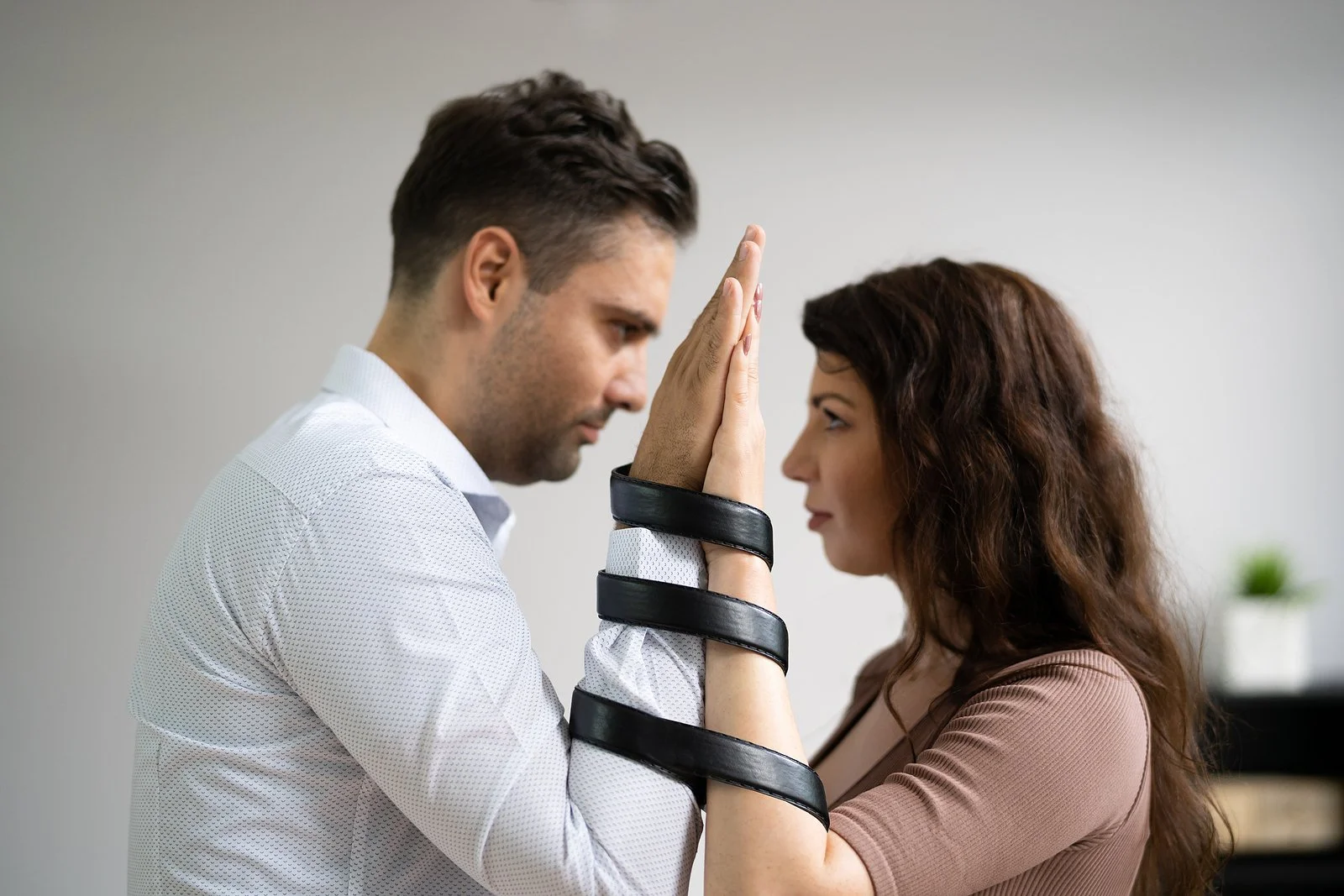You’ve heard the word codependent thrown around plenty of times, but what does it mean in a marriage or love relationship? And what is the difference between being codependent and simply dependent on your spouse or partner? Are you in a dependent relationship?
In schema therapy for couples, we work to help partners identify core life themes that get in the way of their relationships. If you identify with the Dependence or Enmeshment schema, your life may feel overwhelming, like you can’t cope with day-to-day tasks. If you relate to enmeshment, you likely turn to your partner or spouse to help take care of you because you feel like you wouldn’t be able to survive without them. The world can feel too big for that part of you that feels like they need an “adult” to take care of you.
If you find yourself thinking some of the following, you may have the Dependence schema:
I feel more like a child when I try to take on day-to-day tasks
I’m not capable of getting by on my own
My partner can take care of me better than I can take care of myself
I avoid taking on new tasks, but instead let my spouse guide me
I lack common sense and can’t trust my own judgment
Everyday life is overwhelming for me
When you’re reinforcing dependence, you may be constantly asking for the opinions of other people, especially your spouse or partner, and can spin in your mind with all the different feedback until you become paralyzed – exhausting yourself and likely your partner or spouse. We call this “reassurance seeking,” a behavior that can end up pushing those closest to you away. If you’re constantly asking your mate for reassurance, you may not realize that the fear of making a mistake only amplifies as you ask for more reassurance.
When a marriage or love relationship has a lot of insecurity, a partner may feel overcontrolled, leading to a sense of being “chained” to each other
When you’re in a dependent relationship, you likely rely on your mate to take on new situations, since your self-confidence may feel so low. Is your lack of confidence warranted? In some cases, people with the dependence schema have avoided so many tasks in their lives that they have never adequately developed basic skills and the ability to evaluate situations. However, most people who have dependence still exaggerate their incompetence, doubting themselves in situations more than they should. In couples therapy, we work to help dependent clients rely less on their mates, and help the mates learn to empathize while setting appropriate limits so that they are not unintentionally reinforcing the dependence.
Some people cope with their dependent relationship by avoiding tasks they perceive as too difficult, such as driving, facing financial decisions, making major decisions, or taking on new responsibilities. Instead, they put they shift this to their partner or spouse, running away from tasks that could give them more confidence.
In dependent relationships, a partner with enmeshment may allow themselves to experience negative dynamics with their spouse or partner to keep their mate with them. If you put yourself in a subordinate position with your mate, you’ll likely begin to build resentment and anger over time, even though you may not express it directly for fear of driving your partner or spouse away. The result is a person who becomes trapped in an unhealthy, dependent relationship.
Another pattern some partners have in dependent relationships is when they act out on feeling entitled to get their dependence desires met. If you fit this pattern, you likely get angry when your mate doesn’t meet your needs, and punish them by sulking, pouting, and/or getting irritated.
Common symptoms of being in a dependent relationship include experiencing panic attacks, severe anxiety, and agoraphobia. If you experience agoraphobia, you may feel helpless to explore the world – you stay in your apartment where you feel safe without taking on the world, like a child who feels the extremes of helplessness. Markers of progress may feel scary, such as a promotion at work – situations when most people feel a sense of accomplishment instead dredge up dread for you. Over time, reinforcing dependence feels depressing, since low self-esteem is the result of being the dependent partner in the relationship.
The flipside of maintaining a dependent relationship exists if you overcompensate for the Dependence schema – focusing your energy on achieving while being totally independent. What people with this coping style don’t realize is how much the dependence drives their thoughts, emotions, and behaviors. Overcompensation involves constantly fighting against feeling dependent. While you may feel competent, a current of anxiety always lies under the surface. Whenever you achieve something good, for instance, you’re afraid you won’t be able to handle the next level and put a tremendous amount of pressure on yourself to achieve more, leading to a life that is out-of-balance.
We call this pattern “imposter syndrome,” and it comes up in dependent relationships in ways that many people don’t realize. Instead of allowing yourself to get help from your mate in a healthy way, you don’t let them help you at all, refusing to show vulnerability. In love relationships, accessing your vulnerability is one of the most helpful ways to connect. If you overcompensate for dependence, you may be limiting your ability to deepen the intimacy in your marriage or love relationship.
A very different dynamic exists in healthy marriage and love relationships, since love inherently involves a sense of being dependent on each other. Our brain sets off an alarm when we feel our romantic relationship is under threat. We have an “attachment” circuit wired in us that codes a break or separation with our mate as a threat to our survival, leading to protests that can drive our partner further away.
Fear and distance increase when a dependent relationship develops — signs of insecurity in a marriage or love relationship
Couples in a secure and satisfying relationship can feel emotionally connected and secure with each other even when they are physically alone. Partners are able to maintain a sense of self as two individuals in a marriage or love relationship while bringing the relationship together to feel secure with each other. When a relationship is feeling threatened, an insecure dynamic results in more dependence, leading to a sense of codependence – it doesn’t feel safe to have a sense of freedom to explore the world. Partners who are codependent hunker down on their mates and may seem overcontrolling. These behaviors reinforce the worst fears of the dependent partner since the responding partner is likely withdrawing more.
In addition to schema therapy, we practice emotionally focused therapy (EFT), prioritizing emotions and the process of attaching in marriages and love relationships – key ingredients to satisfaction and stability for couples. Schema therapy helps partners identify where intense emotions originate, and combined with EFT, couples can change how they invite and respond to each other in ways that shift the insecurity of codependent relationships to the security of simple dependence on the person you love most in a healthy dynamic. We’ll focus more on how to change codependence, and how to increase the security in your marriage and love relationship in following blogs.



